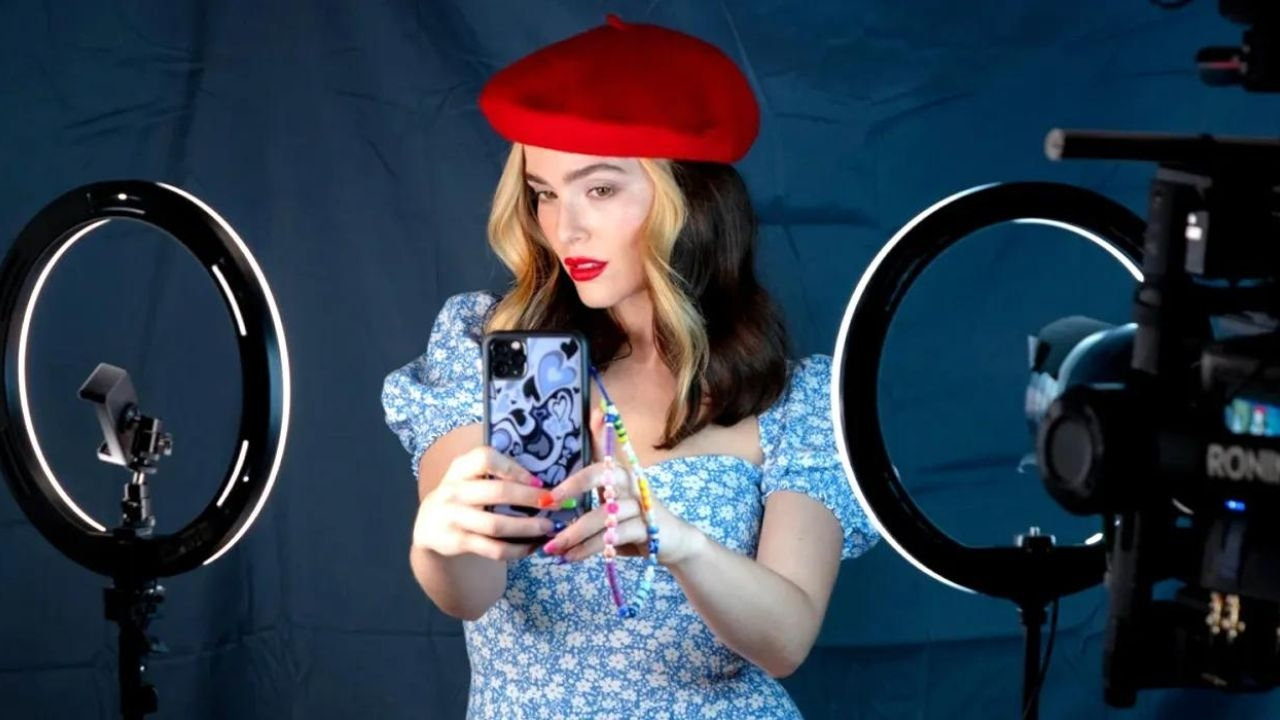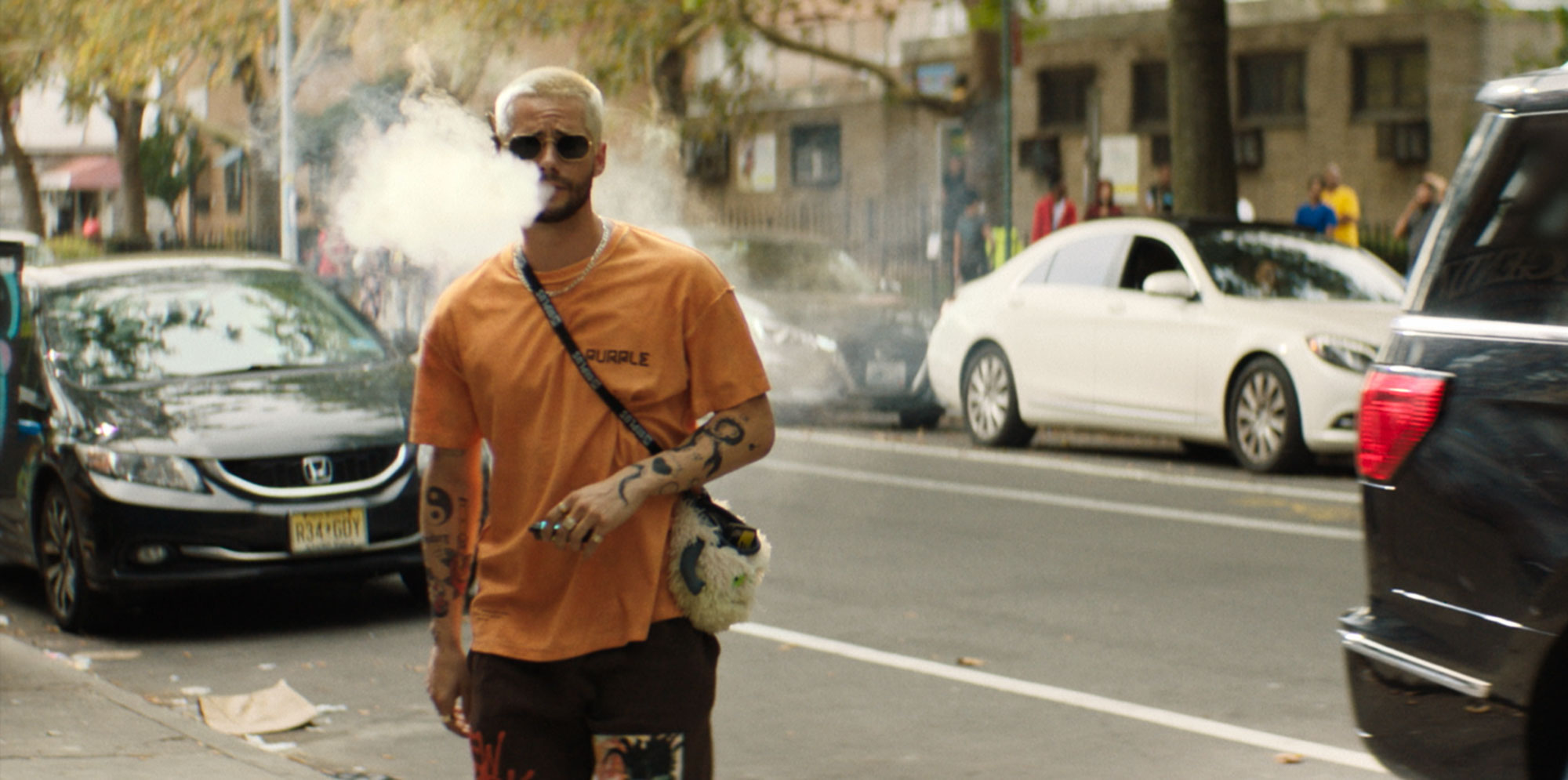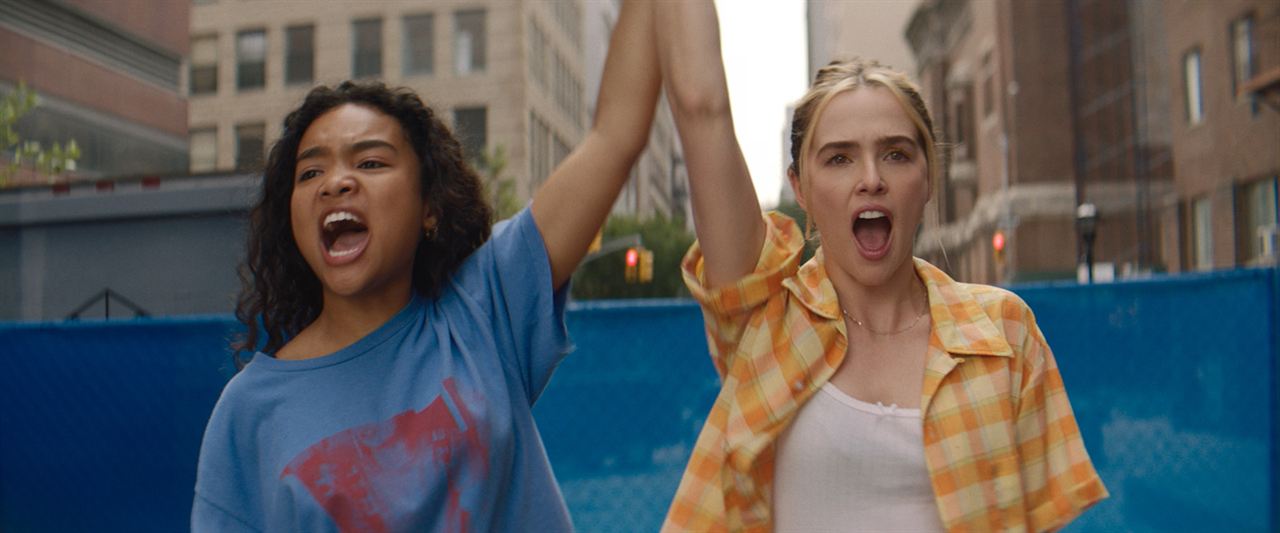In Hulu’s Not Okay, it’s totally okay if you don’t like the female protagonist. In fact, you’re not supposed to. Spoilers ahead.
Not Okay is about a young, privileged white woman named Danni Sanders (Zoey Deutch) who is so bored with her life that she fakes a trip to Paris for clout and the attention of her crush, Colin (Dylan O’Brien). However, things take a turn when a real terrorist attack happens during her fake trip. She capitalizes on this, writing an article about her experience that skyrockets her to fame. She even joins a survivor’s group and befriends a passionate gun reform activist named Rowan (Mia Isaac). But her great new life is threatened when her coworker discovers her lie, and Danni is forced to expose herself to avoid being exposed. In the aftermath, she’s doxxed and hated online. While it initially sounds nothing like Nope, the focus on recording/sharing everything—especially trauma—for profit makes it similar to Jordan Peele’s newest movie.
The content warning at the beginning warns that Not Okay features an unlikable protagonist, and they weren’t kidding! If the content warning went over your head, then you either didn’t watch the movie, didn’t understand it, or you related too much to Danni. Not Okay is a genius satire that criticizes people like Danni Sanders who wish to profit off trauma (like Ricky/Jupe in Nope). Unfortunately, there are a lot of people like her out there. Like many modern, young white women, Danni is chronically online yet out of touch with reality. She wishes she could be a minority or that she could have trauma because she thinks it would make her life more interesting. She is also a consumer first and foremost, displayed in her Y2K fast fashion choices, her rouge blonde bangs, and her big plastic rings that all come from familiar social media trends. (The costume and makeup department for Not Okay did a fantastic job at capturing these current styles). She is the epitome of white mediocrity that seems so marketable.

Danni is an unlikable protagonist. Yet she is also a compelling one at times. There are moments here and there when the audience can sympathize with her. She’s truly depressed and lonely, which many young people can relate to right now. But Danni’s depression is not an excuse to hurt others and co-opt vulnerable voices to amplify her own for attention and clout. Danni has many opportunities to stop herself and apologize over the course of this movie, but she never does. Even after her lie has been exposed, she can’t confront the survivor’s group and apologize. She can’t even give Rowan a heartfelt apology, instead writing a distanced Notes-app apology that looks like it was written by a PR team instead of a real person. The apology isn’t truly for Rowan—it’s for Danni, to make herself feel better. Up until the end, Danni acts selfishly, which is why the movie smartly doesn’t give her a “redemption arc.”
Not Okay also critiques the people around Danni who want to capitalize on her “trauma.” All of the main characters in Danni’s life only care about themselves. Depravity’s clickbait articles, obsession with trends, and lack of substance is purposely similar to modern sites like BuzzFeed, PopSugar, and others. Danni’s boss Judith (Negin Farsad) initially writes Danni’s work off, but as soon as she presents her “trauma” for profit, Judith is happily onboard. Once Danni’s article goes viral and makes Depravity famous, Judith promotes Danni above the other writers and gives her free reign.

Danni’s queer coworkers switch up, too. Before her “trauma,” Larson (Dash Perry) excludes Danni from queer bowling—understandably because she is not queer and not a true ally. After Danni gets back from “Paris” though, Larson invites Danni to queer bowling. At the end of the film, when Danni’s lie has been exposed and Rowan confronts her, Larson eagerly pulls out his phone and begins recording. He and the other Depravity employees immediately turn what should be a very private moment into a drama to share online for entertainment—a moment that’s similar to the characters’ wish to film the alien in Nope. Even Harper (Nadia Alexander), one of the seemingly more sincere employees at Depravity, only tries to expose Danni’s lie after she gets a promotion and an office that Harper wanted. Harper’s main motivation for exposing the truth is jealousy instead of a more genuine care for the well-being of those who Danni hurt.
Let’s not forget Dylan O’Brien’s character Colin, the object of Danni’s affections. Colin represents a male version of Danni’s image-obsessed, careless white girl. Colin is a mediocre white f–ckboy who profits off of acting like stereotypes of urban youth and Hip-Hop culture. Colin’s covered in tattoos, wears baggy clothes and gold chains, and is always smoking a blunt. He performs a blaccent many audiences will be sadly familiar with, as there is an infamous trend where many real-life celebrities, influencers, and everyday people are beginning to appropriate AAVE (African American Vernacular English). Awkwafina was the most recent celebrity to come under fire for her blaccent. In one scene, Harper confronts Colin’s behavior and points out that he’s from Maine, and he finally drops the blaccent for a second. Everything about him is an act.

Not Okay not only addresses how white men profit off co-opting Blackness, but how white women can do the same. Danni’s relationship with Rowan is a huge part of her success. Rowan is a passionate young high schooler who survived a school shooting and now advocates for gun reform. It’s purposeful that she’s played by a Black actress. This adds the nuance of the common phenomenon of white women claiming they want to help Black women, only to speak over them and co-opt their voices when it benefits them. Rowan, like many school shooting survivors, is extremely angry because she is constantly either being crucified by the alt-right for showing any vulnerability or she’s being stolen from by white women like Danni. Rowan reflects the perseverance many victims of violence must have in order to enact change. The movie’s choice to end on her spoken word poem confronting Danni was perfect, as it is Rowan who deserves that catharsis, not Danni.
While it’s quite different from Nope, Not Okay’s themes make it a perfect companion piece to Jordan Peele’s film. Both of these movies exemplify what can happen when self-absorbed people in our social media obsessed society try to capitalize on trauma. And if you found yourself relating a lot to Danni during the movie, you should reflect on the kind of person you want to be going forward. That’s the point of Not Okay—to call out people like Danni and force them to reevaluate themselves, and hopefully make a change for the better.
Not Okay is now streaming on Hulu.










